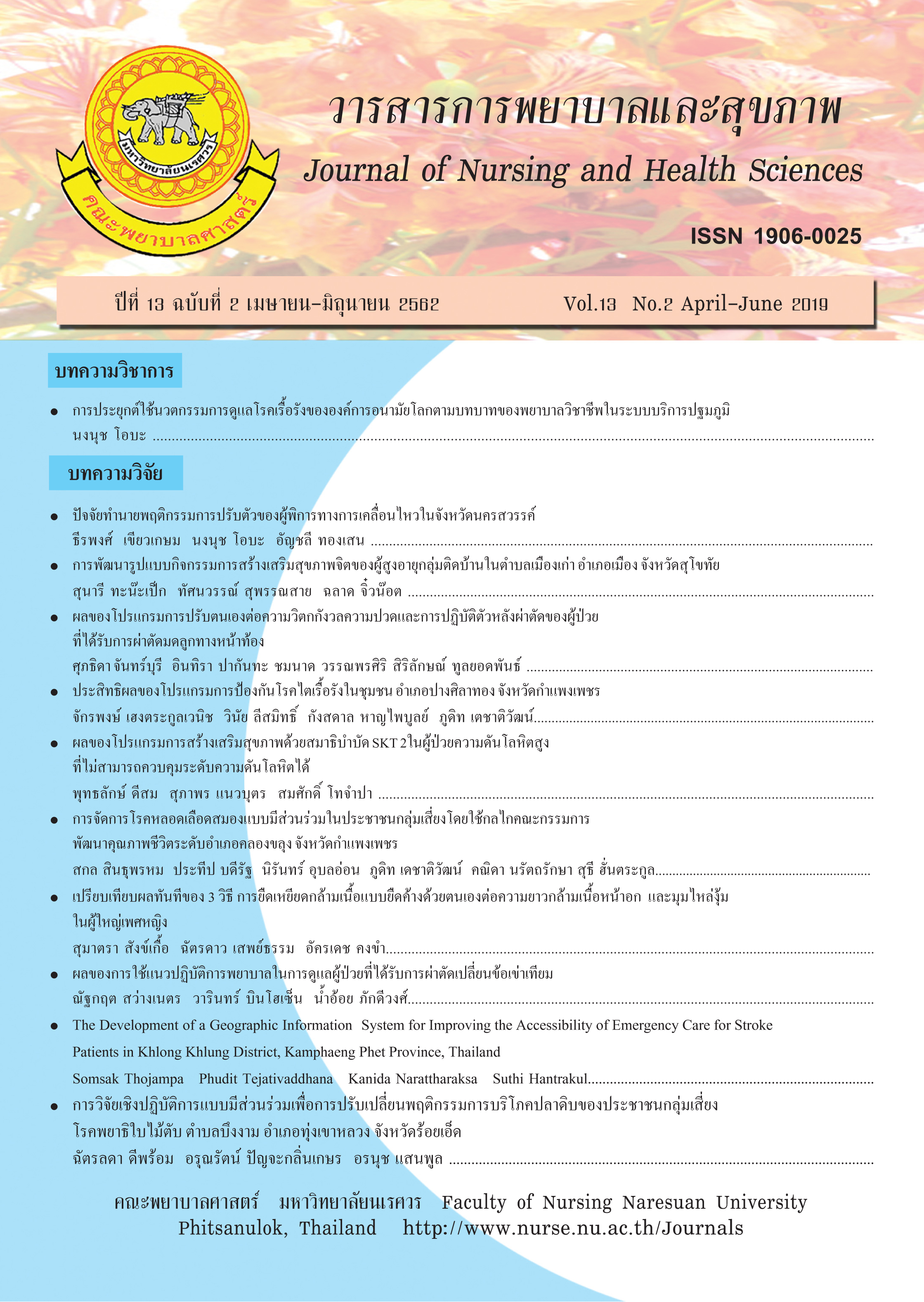The Effect of the Health Promotion Program with Standing Breathing Meditation Exercise SKT 2 among Patients with Uncontrolled Hypertension
Main Article Content
Abstract
The purpose of this quasi-experimental research is to examine the effect on the blood pressure levels using the Health Promotion Program with Standing Breathing Meditation Exercise SKT 2 among patients with uncontrolled hypertension. Sixty participants were divided into experimental and control group, each group was composed of 30 participants which were matched in pairs by considering similarity of gender, age and blood pressure baseline. The research tools were the health promotion program and questionnaires which were tested through content validation by 3 experts with Content Validity Index for 0.67 to 1.0. The experimental group receivedthe health promotion program with Standing Breathing Meditation Exercise SKT 2 during September-October 2018 for 8 weeks, while the control group received standard nursing care. Data were analyzed using descriptive statistics, paired t-test and independent t-tests. The findings found that the average systolic blood pressure and diastolic blood pressure of the experimental group after participating in the program were significantly lower than before participating in the program (p < .05). The results of the study indicated that the health promotion program with Standing Breathing Meditation Exercise SKT 2 could be implemented to effectively to control blood pressure for uncontrolled hypertensive patients.
Article Details
References
Chaimongkhon, A., &Sinthu, S. (2015). Case management
of diabetic patients and high blood pressure
(3rded.). Bangkok :Wattana Printing. [In Thai].
Chibsamanboon, P.,&Sutineam U. (2013).Effects of
the SompornKantaradusdi-Triamchaisri Technique
(SKT 2) on Blood Pressure Levels and
Biochemical Markers. Journal of Boromarajonani
College of Nursing, 29(2), 112-113. [In Thai].
Dan Sai Crown Prince Hospital.(2017). Report of the
Dan Sai Crown Prince Hospital.Loei: Dan Sai
Crown Prince Hospital. [In Thai].
Hypertension Association of Thailand.(2015). Thai
Guidelines on The Treatment of Hypertension
Update 2015. Retrieved 8 April 2017 from
http://www.thaihypertension.org/files/GL%
HT%202015.pdf. [In Thai].
Imoun, S., Mitsungnern, T., &Techa-atik, P. (2015).
Effectiveness of a Praying Therapy for Blood
Pressure Control of Hypertensive Patients.
Journal of Nursing and Health Care, 33(2),
-53. [In Thai].
Kanchanapibunwong, A. (2015). Summary of the annual
disease surveillance report 2015. Retrieved 2
February 2018 from http://www.boe.moph.go.th/
Annual/AESR2015/aesr2558/Part%201/11/
hypertension.pdf. [In Thai].
Karoonngamphan, M., & Suvaree, S. (2016).Reducing
the Risk of Hypertension: The Important Role of
Nurses in Empowering Clients, Songklanagarind
Journal of Nursing, 36(3), 222-233.[In Thai].
Khantamoon, R., & Daenseekaew, S. (2017). Self-
Management among people with uncontrolled
hypertension.Journal of Nursing and Health
Care, 35(2), 89-97. [In Thai].
Ministry of Public Health.(2017). Report of indications at
the Ministry level 2017.Retrieved 19 August
from https://lei.hdc.moph.go.th. [In Thai].
Naewbood, S. (2014). Effect of Practicing SKT 2 Healing
MeditionTo Blood Pressure Level of Essential
Hypertensive Patients. Journal of Nursing and
Health Sciences, 9(3), 14-22.[In Thai].
Panyachotikun, A., Satkong, S., &Sriwisit, S.
(2017).Effects of SKT Meditation Therapy for
Lowering Blood Pressure Level of Patients with
Hypertension in SikaoHospitial, Trang Province.
The Southern College Network Journal of Nursing
and Public Health, 4(2), 245-254. [In Thai].
Prasawang, N., Koshakri R., &Jewpattanakul.(2018).
Effects of the Sitting Breathing Meditation
Combined with UsualCare on Blood Pressure
among Patients with Essential Hypertension
in Primary Care Unit, Journal of Nursing and Health
Care,36(1), 33-42. [In Thai].
Pender, N.J., Murdaugh, C.L., & Parsons, M.A. (2011).
Health promotion in nursing practice(6thed.).
New Jersey: Pearson Education.
Sectisan, P., Suwannaral, A., &Jailungkar, J.
(2013).Factors associated with Self-Care
Behaviors among Uncontrolled Hypertension
Patients in Dokkhamtai Hospital, Dokkhamtai
District, Phayao Province. Journal of Lanna
Public Health, 9(2), 120-36. [In Thai].
Srisathidnarakur, B. (2010). The Methodology in Nursing
research. (5thed.). Bangkok: U&I Intermedia.
[In Thai]
Thamnamsin, K., Amnatsatsue, K., Kerdmongkol,
P.,&Artsanthia, J. (2015).Effects of self-care
promoting program on self-care behavior among
older adults with uncontrolled hypertension in
Bangkok metropolitan. Journal of Public Health
Nursing, 29(2), 43-55. [In Thai].
Tiamchaisi, S. K.(2008). Meditation for health
remedies.Bangkok: Veterans Relief Organization.
[In Thai].
World Health Organization.(2013). A global brief on
Hypertension. Retrieved 2 February 2018 from
https://apps.who.int/iris/bitstream/handle/10665/
/WHO_DCO_WHD_2013.2_eng.pdf;
jsessionid=1F3A45937B1C8F9E0F54C94DD
EA 236A?sequence=%201.


